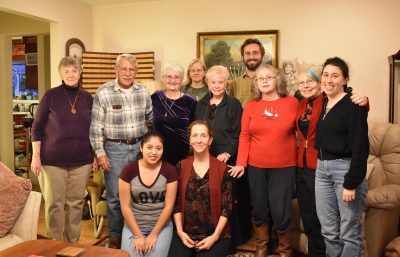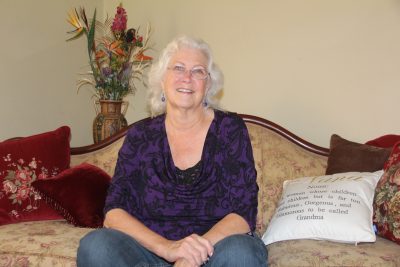Front Porch Blog
This post was co-authored by Daniel Crisp, an intern of Appalachian Voices’ Energy Savings program.
For environmental activists, energy efficiency doesn’t typically come to mind as a cause that the masses rally around.
Despite the huge impact that efficiency can have on reducing emissions from fossil fuels, improving home comfort and boosting local economies, it often lacks the same sway in calling people to action as the threat of encroaching pipelines or new permits for mountaintop removal. This struggle has made support from member organizations like SOCM (Statewide Organizing for Community eMpowerment) essential to Appalachian Voices’ Energy Savings campaign in Tennessee.
Over the last two years, a group of roughly eight SOCM members in Cumberland County — with support from Appalachian Voices — has worked to advocate for the implementation of an on-bill financing program for energy efficiency at their electric co-op, Volunteer Energy Cooperative. The program would make efficiency upgrades accessible to a wide range of participants including renters and credit-constrained households who aren’t usually eligible for financing.
The SOCM members’ motivations are straightforward: “I think [energy efficiency] is the most important thing we can do right now — even beyond developing alternative renewable sources, just not using as much energy in the first place,” says Jean Cheely, co-chair of the Cumberland County SOCM Chapter. She and other members have secured meetings with their co-op’s local service representative and are currently working toward meeting with board members about the program.
The Cumberland Chapter has also been engaged in outreach at the grassroots level, visiting food pantries and service agencies to provide education and gain letters of support from co-op members who would benefit from the program. Patti Lewis, who lives in Crossville, feels that access to energy efficiency is especially important in rural communities. “In my neighborhood there is a large degree of economic diversity … because we are rural, you can drive past wealthy gated communities and, down the street, you see communities of manufactured homes … it would provide a great benefit if [those residents] could lower their bills.”
In Cumberland County, residents below 50 percent of the federal poverty line spend around 30 percent of their income on energy bills. In order to reach these residents in need, SOCM members will be co-hosting an Energy Efficiency Workshop with Appalachian Voices at a local hunger ministry. Participants in the workshop will learn free or low-cost ways to lower their electric bills and will be able to sign letters in support of an on-bill financing program at Volunteer Energy Co-op.
Flo Matheson, who wrote an excellent breakdown of the “Pay As You Save” on-bill financing model (see below), views advocacy around on-bill financing as “a way for members to help their neighbors.” She plans to give each workshop participant extra letters so they can reach out to other co-op member-owners who would benefit from the program.
While SOCM members in rural Tennessee have been working for access to energy efficiency financing through their electric co-op, a SOCM member in Knoxville recently participated in a program offered by her municipal utility, Knoxville Utilities Board.
Regis Borsari is 76 years old, retired, and plays an active role in her community by attending SOCM meetings and regularly volunteering at Ijams Nature Center, the Knoxville Museum of Art and the Candoro Marble Museum. Her small brick house in the Vestal neighborhood of South Knox was built in the ‘30s, and although she took steps to weatherize the aging home when she moved to Knoxville 11 years ago (adding storm windows and new insulation in her basement and attic), her energy bill continued to be burdensome.
Regis considered applying for LIHEAP (Low Income Home Energy Assistance Program) funding to help lift some of that burden, but soon realized that she wouldn’t eligible. “I knew their criteria was far more strict and I likely wouldn’t qualify, although a friend of mine in the community does receive about $300 of assistance on her energy bill each year from LIHEAP,” she says. Like many people in Tennessee, Regis was left in the difficult position created by gaps in typical assistance programs. So when she heard of the “Knoxville Extreme Energy Efficiency Makeover” (KEEM) contest that finished up this fall, she decided to apply and went on to become a KEEM Neighborhood Ambassador, helping the program reach affected Knoxville residents.
Through the TVA-funded program, upwards of 1,200 low-income homes that were twenty or more years old received free energy efficiency upgrades, including insulation, air sealing, appliances and central heating and air units. KEEM was designed so that upgrades to each home would reduce energy consumption by 25 percent or more. The results proved true for Regis, who received an energy-efficient HVAC unit with a touchscreen interface, a water heater, new ductwork and insulation repairs thanks to KEEM. “My home was built in 1932, and it was costing me a lot of money each month. Since receiving the upgrades my bill has gone down substantially.”
Personal impacts aside, Regis feels that “energy efficiency is an issue that involves the whole community, because the use of energy is one of the most burdensome expenses for [everyone].” She’s kept up with Knoxville’s efforts to strive for efficiency, noting the new LED lighting project that’s soon to be implemented and the Round It Up program, which raises money for low-income weatherization assistance. Regis went on to say that Knoxville was “very lucky to receive the TVA-funded grant” and that she believes the results will show that similar energy efficiency programs would be a “worthwhile pursuit for the betterment of the community.”
Whether in advocating for inclusive access to energy efficiency or by enrolling in existing programs, SOCM members in East Tennessee have shown dedication to reducing energy waste in their communities. If you’re near Cumberland County and are interested in joining the SOCM Chapter to work on energy efficiency and other social and environmental issues, contact SOCM Organizer Adam Hughes at adam@socm.org.
To learn more about the financing model that the Chapter has been advocating for at Volunteer Energy Co-op, read SOCM member Flo Matheson’s break-down of “Pay As You Save” below. Members of other electric co-ops in East Tennessee seeking access to efficiency upgrades can get involved with inclusive financing efforts by contacting Appalachian Voices’ Outreach Coordinator Brianna Knisley at brianna@appvoices.org.
Pay As You Save and On-Bill Financing
By Flo Matheson (SOCM / Volunteer Energy Co-op member, Cumberland County, Tenn.)I don’t know about you guys, but I dread the cold weather and the high electric bills when winter comes. There is relief for us if SOCM and other community-based organizations can persuade our electric companies and utilities to participate in a program that is designed to get our houses warmer and our bills lower. Sounds too good to be true, but it does work, and it is the electric company that must get the ball rolling.
They do so by applying for funds from the U.S. Department of Agriculture. The money goes to the utility, which pays in advance for needed improvements to weatherize our homes. This is actually paid back through an extra charge on your bill. The good news is your house will be warmer, but your bill will be lower even with the repayment charge in it, because of your lower use of energy.
All residential customers can apply because all types of housing are covered, including multi-family units and manufactured homes. Owners and renters can apply, and the monthly charge stays with the residence, not with the resident. If you sell or move, the person who moves in just picks up where you left off. The program is tailored for those living in inefficient housing who are unable to pay for improvements in advance, but it’s available to everyone. And poor credit is not an impairment as only your electric bill payments determine if you are eligible.
Improvements that can be funded may vary. They are typically determined by cost-effectiveness and can range from sealing all air leaks, insulating attics and floors, window caulking, and repairs or replacement or appliances or heat pumps. Every case is different, and contractors advise the utilities.
The basic premise is that the extra service charge on your bill to pay back the utility for the improvements is less than what you save by having an energy efficient home. The utility may take 80 percent of the savings to recover their cost, leaving 20 percent of the savings to you. When the loan is paid off you get 100 percent of the savings and a weatherized residence.
PREVIOUS
NEXT
Related News

Leave a comment
Your email address will not be published. Required fields are marked *



